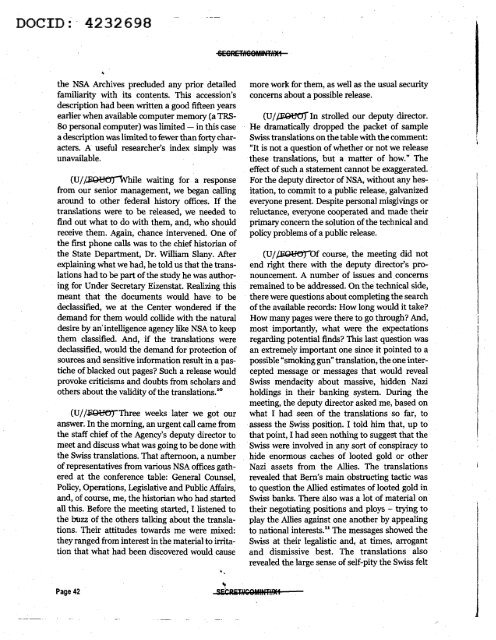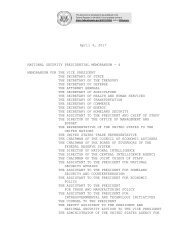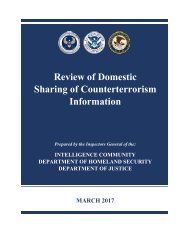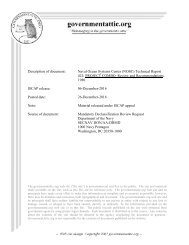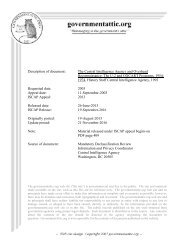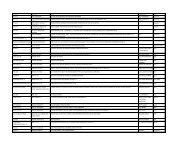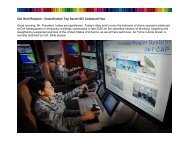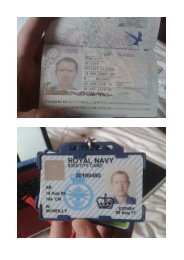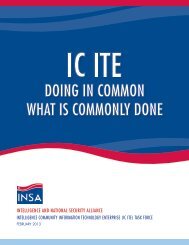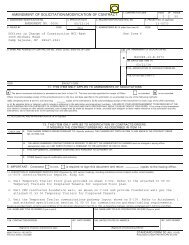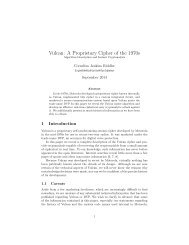government undersecretary
nsa-nazi-gold
nsa-nazi-gold
You also want an ePaper? Increase the reach of your titles
YUMPU automatically turns print PDFs into web optimized ePapers that Google loves.
DOC'ID: · 4232698<br />
SE6RETI\'69MIN'ffflE1<br />
the NSA Archives precluded any prior detailed<br />
familiarity with its contents. This accession's<br />
description had been written a good fifteen years<br />
earlier when available computer memory (a TRS-<br />
8o personal computer) was limited - in this case<br />
a description was limited to fewer than forty characters.<br />
A useful researcher's index simply was<br />
unavailable. ·<br />
(U I l~ile waiting for. a response<br />
from our senior management, we began calling<br />
around to other federal history offices. If the<br />
translations were to be released, we needed to<br />
find out what to do with them, and, who should<br />
receive them. Again, chance intervened. One of<br />
the first phone calls was to the chief historian of<br />
the State Department, Dr. William Slany. After<br />
explaining what we had, he told us that the translations<br />
had to be part of the study he was authoring<br />
for Under Secretary· Eizenstat. Realizing this<br />
meant that the documents would have to be<br />
declassified, we at the Center wondered if the<br />
demand for them would collide with the natural<br />
desire by an' intelligence agency like NSA to keep<br />
them classified. And, if the translations were<br />
declassified, would the demand for protection of<br />
sources ax,.d sensitive information result in a pastiche<br />
of blacked out pages? Such a release would<br />
provoke criticisms and doubts from scholars and<br />
others about the validity of the translations. 10<br />
(U I j.liQl::Te}Three weeks later we got our<br />
answer. In the morning, an urgent call came from<br />
the staff chief of the Agency's deputy director to<br />
meet and discuss what was going to be done with<br />
the Swiss translations. That afternoon, a number<br />
of representatives from various NSA offices gathered<br />
at the conference table: General Counsel,<br />
Policy, Operations, Legislative and Public Affairs,<br />
and, of course,me, the historian who had started<br />
all this. Before the meeting started, I listened to<br />
the buzz of the others talking about the translations.<br />
Their attitudes towards me were mixed:<br />
they ranged from interest in the material to irritation<br />
that what had been discovered would cause<br />
more work for them, as well as the usual security<br />
concerns about a possible release.<br />
(U I~ In strolled our deputy director.<br />
He dramatically dropped the packet of sample<br />
Swiss translations on the table with the comment:<br />
"It is not a question of whether or not we release<br />
these translations, but a matter of how." The<br />
effect of such a statement cannot be exaggerated. ·<br />
For the deputy director of NSA, without any hesitation,<br />
to commit to a public release, galvanized<br />
everyone present. Despite personal misgivings or<br />
reluctance, everyone cooperated and made their<br />
primary concern the solution of the technical and<br />
policy problems of a public release.<br />
(U I ~Of course, the meeting did not<br />
end right there with the deputy director's pronouncement.<br />
A number of issues and. concerns<br />
remained to be addressed. On the technical side,<br />
there were questions about completing the search<br />
of the available records: How long would it take?<br />
How many pages were there to go through? And,<br />
most importantly, what were the expectations<br />
regarding potential finds? This last question was<br />
an extremely important one since it pointed to a<br />
possible "smoking gun" translation, the one intercepted<br />
message or messages that would reveal<br />
Swiss mendacity about massive, hidden Nazi<br />
holdings in their banking system. During the<br />
meeting, the deputy director asked me, based on<br />
what I had seen of the translations so far, to<br />
assess the Swiss position. I told him that, up to<br />
that point, I had seen nothing to suggest that the<br />
Swiss were involved in any sort of conspiracy to<br />
hide enormous caches of looted gold or other<br />
Nazi assets from the Allies. The translations<br />
revealed that Bern's main obstructing tactic was<br />
to question the Allied estimates of looted gold in<br />
Swiss banks. There also was a lot of material on<br />
their negotiating positions and ploys - trying to<br />
play the Allies against one another by appealing<br />
to national interests. 11 The messages showed the<br />
Swiss at their legalistic and, at times, arrogant<br />
and dismissive best. The translations also<br />
revealed the large sense of self-pity the Swiss felt<br />
I<br />
I<br />
Page 42<br />
"' SECRI!'fJ!G9MIN'fJRU


